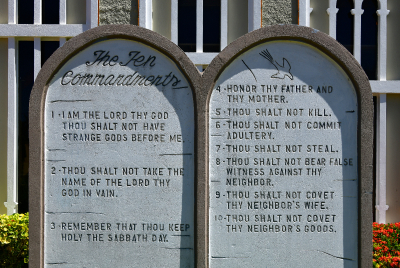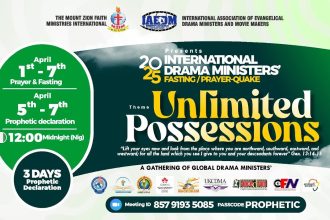
I know you’ll be shocked and amazed to hear this, but here goes: the Bible has a lot of commandants for us.
Jewish tradition catalogs a little over 600 specific commands in the first five books of the Old Testament (the Torah) alone. Regarding the New Testament, one study counted 1,050 specific commands.
Yowza.
Keeping track of all those would require superhuman abilities, and so, thankfully, Jesus tallied everything up for us when He said: “You shall love the Lord your God with all your heart and with all your soul and with all your mind. This is the great and first commandment. And a second is like it: You shall love your neighbor as yourself. On these two commandments depend all the Law and the Prophets” (Matt. 22:37–40).
Although that’s a great summation, there are still times when we need a light shined on specific commands to keep us on the right track, with those being dependent on our specific areas of weakness. For me, that spotlight stays fixed about 99% of the time on one Bible command I definitely break the most: “Be slow to speak” (James 1:19).
The full verse in James reads: “This you know, my beloved brethren. But everyone must be quick to hear, slow to speak and slow to anger” (James 1:19–20).
“Aha”, you say, “You must struggle with anger! And because of that, I’m betting you’re quick to lash out at others in rage with unkind words.”
Truth be told, it’s very rare for me to do that. My issue with being slow to speak is actually multi-faceted and directed more vertically than horizontally, making it a bit uglier.
Despair is for omniscient people
When Jesus said, “Each day has enough trouble of its own” (Matt. 6:34), He sure wasn’t kidding.
If you’re like me and have had a lot of troubling days and tragedies pile up on you, it can sometimes get a bit overwhelming. Facing it all head-on sometimes feels like what Ernest Becker wrote in his Pulitzer Prize-winning book, The Denial of Death: “I think that taking life seriously means something such as this: that whatever man does on this planet has to be done in the lived truth of the terror of creation, of the grotesque, of the rumble of panic underneath everything. Otherwise it is false.”
When the threat of terror and “panic rumbles” come in a seemingly endless, pedal-to-the-metal fashion, we can find ourselves experiencing the “Eeyore effect” where a downward spiral of negativity, pessimism, and exhaustion results. I’ve been there more times than I can count, and maybe you have too. As Christians, what often happens in those situations is we look Heavenward and are anything but “slow to speak” when it comes to venting our frustration, fear, and anxiety at God.
Now, there’s a right and wrong way to do that. The right way is described by J. Todd Billings in his book Rejoicing in Lament where he shows that lamenting our pain and distresses to God as exemplified in the Psalms is not sinful, but rather an expression of faith.
My problem, though, is one where as trouble starts brewing, I quickly look upward in a despairing way and sound like Eeyore, complaining, “Here we go again.” I do it in an all-hope-is-lost fashion when the outcome is not actually clear yet. Like a previously beaten dog who expects more of the same, I figure only bad things are coming.
I forget in those times that most fear is the misuse of imagination, or as Seneca said: “We’re more frightened than hurt. We suffer more from imagination than reality.”
That said, the Bible doesn’t tell us to flippantly brush off looming threats but instead gives a balanced approach of: “Tremble, and do not sin; meditate in your heart upon your bed, and be still” (Ps. 4:4).
Tim Keller delivers good advice to people like me when he reminds us that despair is only appropriate for omniscient people, which none of us are:
“Despair is always an act of arrogance. Do you know that? The only way you can be in despair is if you’re absolutely sure that since you can’t see any reason, any way, any good can come out of this, there can’t be any. Despair is for omniscient people. Are you? No, but you’re acting that way.”
A solid reminder on this comes from Jesus in Luke 8 that we all know well, which describes a storm that came against the boat that the disciples and Christ were in. After Jesus dispels the storm, He looks at the panic-stricken disciples and asks, “Where is your faith?” (Luke 8:25). Notice He doesn’t tell them to go get faith, but rather to bring to the surface the faith they already have.
That’s definitely something I need to practice more, and hopefully, one day soon, I’ll be slower to speak when dark clouds appear on the horizon. Solomon warns, “Do not be hasty in word or impulsive in thought to bring up a matter in the presence of God. For God is in heaven and you are on the earth; therefore let your words be few” (Ecc. 5:2).
Ultimately, it comes down to practicing an unwavering trust in the One who made us. Or, put another way, the more child-like we are when it comes to our faith and trust in God, the less childish we’ll be in our speech and attitude.
Robin Schumacher is an accomplished software executive and Christian apologist who has written many articles, authored and contributed to several Christian books, appeared on nationally syndicated radio programs, and presented at apologetic events. He holds a BS in Business, Master’s in Christian apologetics and a Ph.D. in New Testament. His latest book is, A Confident Faith: Winning people to Christ with the apologetics of the Apostle Paul.








